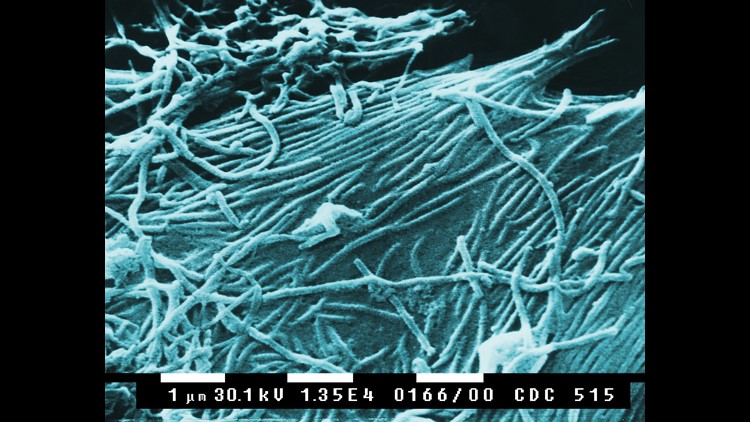Dr. Tom Frieden said on “State of the Union” that the CDC is concerned about family members who had “very close contact” with the victim but that they were being monitored constantly.
“That’s how you stop it in its tracks. That’s why we’re confident we won’t see a large number of cases from this,” he told Candy Crowley.
Relatives will be monitored for 21 days from their last contact with Thomas Eric Duncan, the only patient to develop Ebola in the United States. If any of them gets a fever, he or she will be isolated, Frieden said.
“That’s how we break the chain of transmission, and that’s what is going to make sure that we don’t have a large outbreak in Dallas or elsewhere in the U.S.,” he added.
About 10 people are at “higher risk” of catching Ebola after coming into contact with Duncan but have showed no symptoms, health officials said. Three of them are family members, and seven are health-care workers, who are now on paid leave.
The group is among 50 people being monitored daily, but the other 40 are considered “low risk,” Dr. David Lakey, commissioner of the Texas Department of State Health Services, said Saturday.
Police are looking for one of the people on the low-risk list. After being checked Saturday and being told to stay where he was, the man left and hasn’t been seen since. His temperature was normal, and he was not showing symptoms of Ebola before he disappeared, officials said.
Critical condition patient
Duncan is in critical condition, a Texas Health Presbyterian Hospital spokeswoman said Saturday.
The Liberian national had previously been listed as being in serious condition. Hospital spokeswoman Candace White offered no new details other than his condition.
Duncan arrived in Dallas on September 20 and started feeling sick days later. He made his initial visit to Texas Health Presbyterian Hospital on September 25.
He was released with antibiotics but went back three days later and was quickly isolated. A blood test Tuesday confirmed that he had Ebola.
Relocated to undisclosed location
“We’ve been very busy the last 24 hours trying to make sure that everyone who has had potential exposure is identified and they have been evaluated,” Lakey said.
The high-risk list probably includes Duncan’s partner, Louise, her 13-year-old son and her two 20-something nephews. The four had been holed up in the apartment where Duncan had stayed before he was hospitalized.
They were relocated to an undisclosed place Friday and will be required to stay there until October 19. The incubation period — the time between Ebola infection and the onset of symptoms — ranges from two to 21 days.
The Dallas hospital where Duncan is being treated has come under fire for its handling of his first visit there eight days ago.
Louise, who does not want her last name used, said Duncan told hospital staff that he had a fever and abdominal pain, and had recently arrived from Liberia, key information that could have been a tipoff for Ebola.
Health care workers across the nation “have to learn from the experience,” Lakey said Saturday.
“The travel history is very important to take, and it has to be communicated,” he said.
The hospital defended its handling of the case.
“As a standard part of the nursing process, the patient’s travel history was documented and available to the full care team in the electronic health record, including within the physician’s workflow,” it said in a statement.
The church Louise attends said Duncan came to the United States so the two could get married.
Louise told the church’s senior pastor, George Mason, about their marriage plan, according to Mark Wingfield, a spokesman at Wilshire Baptist Church in Dallas.
American doctor back in hospital
An American patient treated for Ebola in Nebraska and then released is now in isolation in a hospital in Massachusetts.
Dr. Richard Sacra went to an emergency room early Saturday in Boston with a cough and fever, according to the missionary organization Serving in Mission. He was afraid he might have pneumonia.
Because of his previous infection, he was transferred to the UMass Memorial Medical Center in Worcester, the center said in a statement.
Doctors there don’t believe his symptoms point to a recurrence of Ebola but instead a respiratory infection. But they are keeping Sacra in isolation in accordance with guidelines from the CDC until the health institute gives the all-clear.
“We’re waiting for final test results from the CDC, which we expect to receive late Monday,” said lead physician Dr. Robert Finberg.
Sacra had worked as a medical missionary in Liberia but not directly with Ebola patients. Nevertheless, he contracted the disease. He was treated in isolation at the Nebraska Medical Center in Omaha and then released after testing negative for the virus.
Other Ebola scares
As nervous Dallas residents watch Duncan’s case unfold, more Ebola scares have popped up in other parts of the nation.
Howard University Hospital in Washington said Friday that it had admitted a low-risk patient with symptoms that could be associated with Ebola, but health officials said Saturday that Ebola had been ruled out in that case. The unnamed patient had recently traveled to Nigeria.
In Liberia, NBC News freelance cameraman Ashoka Mukpo was diagnosed with Ebola on Thursday and is expected to leave Monrovia for the United States on Sunday aboard a private charter plane.
In addition to Guinea and Sierra Leone, Liberia is one of three nations battling the deadly virus.
The CDC remains very concerned about the Ebola outbreak in western Africa, where more than 3,000 people have died. The longer it remains a problem there, the greater the risk for other areas of the world, Frieden said. But battling the disease will be a “long, hard fight,” he continued.
“The virus is spreading so fast that it’s hard to keep up,” the CDC director said.
CNN’s Ray Sanchez, Faith Karimi, Joe Sutton and Janet DiGiacomo contributed to this report.



